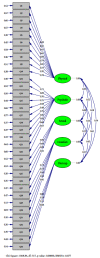Cross-cultural adaptation, reliability, and validity of the Turkish version of the obesity-specific quality of life questionnaire: quality of life, obesity, and dietetics (QOLOD) rating scale
- PMID: 33964861
- PMCID: PMC8742480
- DOI: 10.3906/sag-2005-412
Cross-cultural adaptation, reliability, and validity of the Turkish version of the obesity-specific quality of life questionnaire: quality of life, obesity, and dietetics (QOLOD) rating scale
Abstract
Background/aim: Obesity is one of the main public health issues in many countries including Turkey. The aim of the study is to test cross-cultural adaptation, reliability, and validity of QOLOD rating scale in the Turkish language.
Materials and methods: This methodological study was conducted among the overweight and obesity people between February-March, 2018 in Ankara Atatürk Training and Research Hospital. The data was collected through self-report and face to face interviews. The QOLOD rating scale has 36 items, a 5-point Likert scale (1–5) is used for each question.
Results: In the study, of the 180 participants, 101 (56.1%) were female, 79 (43.9%) were male, and the mean age was 43.36 ± 14.28 (min-max 18–87) years. According to the CFA, the Turkish version of QOLOD rating scale shows a multidimensional structure consisting of 34 items. Two items (item 11 and item 35) were excluded from the scale according to the CFA. Cronbach’s Alpha value changes between 0.927–0.930.
Conclusion: Finding shows that the Turkish version of QOLOD rating scale had sufficient validity and reliability for Turkish population, had strong psychometric characteristics.
Keywords: Obesity; QOLOD rating scale; Turkish version.
This work is licensed under a Creative Commons Attribution 4.0 International License.
Conflict of interest statement
Authors declare that there is no conflict of interest.
Figures
Similar articles
-
Development and validation of a French obesity-specific quality of life questionnaire: Quality of Life, Obesity and Dietetics (QOLOD) rating scale.Diabetes Metab. 2005 Jun;31(3 Pt 1):273-83. doi: 10.1016/s1262-3636(07)70194-5. Diabetes Metab. 2005. PMID: 16142018
-
Cross-cultural adaptation and psychometric evaluations of the Turkish version of Parkinson Fatigue Scale.Qual Life Res. 2018 Oct;27(10):2719-2730. doi: 10.1007/s11136-018-1907-3. Epub 2018 Jun 7. Qual Life Res. 2018. PMID: 29881896
-
Cross-cultural adaptation of the Diabetes Management Self-Efficacy Scale for patients with type 2 diabetes mellitus: scale development.Int J Nurs Stud. 2006 Jul;43(5):611-21. doi: 10.1016/j.ijnurstu.2005.07.008. Epub 2005 Oct 18. Int J Nurs Stud. 2006. PMID: 16239003
-
The Nordic Musculoskeletal Questionnaire: cross-cultural adaptation into Turkish assessing its psychometric properties.Disabil Rehabil. 2016 Oct;38(21):2153-60. doi: 10.3109/09638288.2015.1114034. Epub 2016 Jan 4. Disabil Rehabil. 2016. PMID: 26726840
-
Reliability and validity of a Turkish version of the Sexual Quality of Life - Male questionnaire: a methodological study.Sex Health. 2018 Nov;15(5):413-419. doi: 10.1071/SH18074. Sex Health. 2018. PMID: 30292249
References
-
- Campos P Saguy A Ernsberger P Oliver E Gaesser G. The epidemiology of overweight and obesity: public health crisis or moral panic? International Journal of Epidemiology. 2006;35:55–60. - PubMed
-
- Engin A. The definition and prevalence of obesity and metabolic syndrome. Advances in Experimental Medicine and Biology. 2017;960:1–17. - PubMed
-
- Bandera EV Fay SH Giovannucci E Leitzmann MF Marklew R The use and interpretation of anthropometric measures in cancer epidemiology: a perspective from the world cancer research fund international continuous update project. International Journal of Cancer. 2016;1:2391–2397. - PubMed
-
- BMI classification percentile and cut off points. StatPearls Publishing. 2021. pp. 31082114–31082114. - PubMed
-
- Obesity as a Growing Public Health Problem in Adiposity - Epidemiology and Treatment Modalities 2017.
MeSH terms
LinkOut - more resources
Full Text Sources
Other Literature Sources
Medical


